if条件句中的时态应用
if从句的过去时态
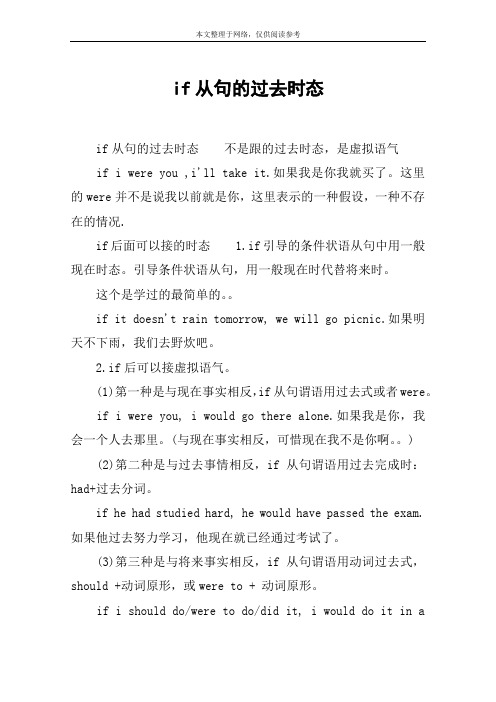
if从句的过去时态if从句的过去时态不是跟的过去时态,是虚拟语气if i were you ,i'll take it.如果我是你我就买了。
这里的were并不是说我以前就是你,这里表示的一种假设,一种不存在的情况.if后面可以接的时态 1.if引导的条件状语从句中用一般现在时态。
引导条件状语从句,用一般现在时代替将来时。
这个是学过的最简单的。
if it doesn't rain tomorrow, we will go picnic.如果明天不下雨,我们去野炊吧。
2.if后可以接虚拟语气。
(1)第一种是与现在事实相反,if从句谓语用过去式或者were。
if i were you, i would go there alone.如果我是你,我会一个人去那里。
(与现在事实相反,可惜现在我不是你啊。
)(2)第二种是与过去事情相反,if从句谓语用过去完成时:had+过去分词。
if he had studied hard, he would have passed the exam.如果他过去努力学习,他现在就已经通过考试了。
(3)第三种是与将来事实相反,if从句谓语用动词过去式,should +动词原形,或were to + 动词原形。
if i should do/were to do/did it, i would do it in adifferent way.如果我做这个,我将会用另一种方法来做。
if条件句的时态if有两大用法,一个是译为一般的如果,一个是用作假设的如果在 if 引导的条件状语从句中,如果从句谈论的是一个推测将来有可能发生的事实,主句用一般将来时态,从句用一般现在时态。
一般译为如果,如:if it rains tomorrow,i won't go out.如果 if 条件句谈论的是一个主观的意愿,则主句,从句大多用一般现在时态。
一般译为如果,如:if you dont want to go out ,you can stay at home.if还有一个最重要的用法,用于虚拟句。
if 条件状语从句
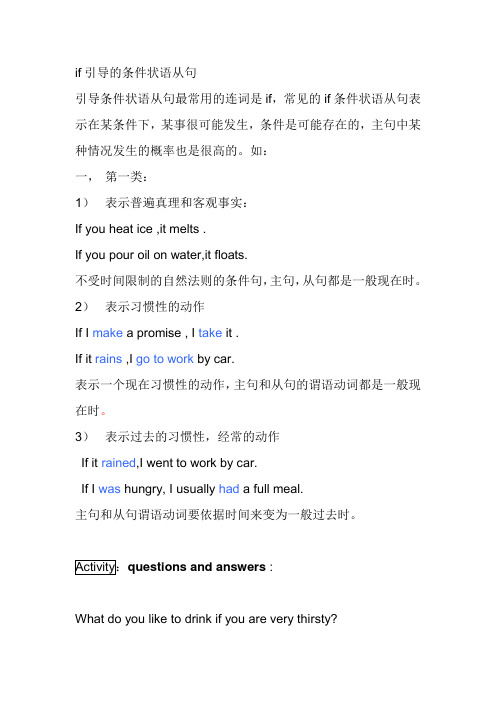
if引导的条件状语从句引导条件状语从句最常用的连词是if,常见的if条件状语从句表示在某条件下,某事很可能发生,条件是可能存在的,主句中某种情况发生的概率也是很高的。
如:一,第一类:1)表示普遍真理和客观事实:If you heat ice ,it melts .If you pour oil on water,it floats.不受时间限制的自然法则的条件句,主句,从句都是一般现在时。
2)表示习惯性的动作If I make a promise , I take it .If it rains ,I go to work by car.表示一个现在习惯性的动作,主句和从句的谓语动词都是一般现在时。
3)表示过去的习惯性,经常的动作If it rained,I went to work by car.If I was hungry, I usually had a full meal.主句和从句谓语动词要依据时间来变为一般过去时。
questions and answers :What do you like to drink if you are very thirsty?How many days are there in February it it is a leap year ? Who do people go and see if they get ill ?第二类:If we catch the 10 o’clock train ,we shall (will ,can,may,must ,should ) get there in time .If it is fine tomorrow ,we can have a picnic somewhere.If you wake up before me , give me a call .条件句(从句)用一般现在表示将来,主句用shall 加动词原型或者是祈使句在if 引导的条件状语从句中,如果从句谈论的是一个有可能发生的事实及其产生的相关的结果,主句用一般将来时态,从句用一般现在时态。
if条件状语从句及其时态的用法

if条件状语从句及其时态的用法*概念引入英国前首相撒切尔夫人〔Margaret Thatcher〕曾用if条件句对男人和女人进行评价:In politics, if you want someone to make a speech, ask a man; if you want something done, ask a woman. 在政治领域,如果你想要有人发表演说,那就找男士去;而如果你想真正把事情解决,那就找女士。
*用法讲解一、概念连词if的意思是“如果〞,它引导的句子表示某事发生所需要的条件,即“在……条件下某事才能发生〞,在句子中充当状语,因此我们称之为条件状语从句。
在复合句中连词if 引导的句子为从句,被修饰的句子为主句。
从句可以放在主句后,也可以放在主句前,从句放在主句前时,应用逗号将它与主句隔开。
例如:We’ll go to the Great Wall if it doesn’t rain tomorrow.= If it doesn’t rain tomorrow, we’ll go to the Great Wall. 如果明天不下雨,我们就去长城。
二、用法1. 条件状语从句通常由连词if引导,意为“如果,假设〞,主句不能用be going to 表示将来,而应该用shall或will。
例如:If I’m free tomorrow, I’ll go with you. 如果我明天有空,我将会和你一起去。
2. if引导的条件状语从句,主句用一般将来时,从句那么用一般现在时,即“主将从现〞。
例如:If it is sunny tomorrow, I’ll climb the hill. 如果明天天气晴朗,我将去爬山。
3. 正确区分if引导的条件状语从句和if引导的宾语从句。
在条件状语从句中,if表示“如果〞;而在宾语从句中,if表示“是否〞。
可以用下面的方法区分:1) 从句前置法:if引导的条件状语从句,可以放在主句之前并用逗号隔开,也可放在主句之后;而if引导的宾语从句只能放在主句之后。
If引导条件句的用法

If 引导条件句的用法1、真实条件句用于陈述语气,假设的情况可能发生,其中if 是如果的意思;时态关系句型:条件从句主句一般现在时shall/will + 动词原形If he comes, he will bring his violin.典型例题The volleyball match will be put off if it ___.A. will rainB. rainsC. rainedD. is rained答案B;真实条件句主句为将来时,从句用一般现在时;注意:1 在真实条件句中,主句不能用be going to表示将来,该用shall, will.错If you leave now, you are never going to regret it.对If you leave now, you will never regret it.2 表示真理时,主句谓语动词便不用shall will +动词原形,而直接用一般现在时的动词形式;2 非真实条件句1时态:可以表示过去,现在和将来的情况;它的基本特点是时态退后;a. 同现在事实相反的假设;句型:条件从句主句一般过去时should would +动词原形If they were here, they would help you.b. 表示于过去事实相反的假设;句型:条件从句主句过去完成时shouldwould have+ 过去分词If she had worked harder, she would have succeeded.The rice would not have been burnt if you had been more careful.If my lawyer had been here last Saturday, he would have prevented me from going.If he had come yesterday, I should / would have told him about it.含义:He did not come yesterday, so I did not tell him about it.If he had not been ill and missed many classes, he would have made greater progress.含义:He was ill and missed many lessons, so he did not make greater progress.c. 表示对将来的假想句型:条件从句主句一般过去时should+ 动词原形were+ 不定式would + 动词原形should+ 动词原形If you succeeded, everything would be all right.If you should succeed, everything would be all right.If you were to succeed, everything would be all right.3 混合条件句主句与从句的动作发生在不同的时间,这时主,从句谓语动词的虚拟语气形式因时间不同而不同,这叫做混合条件句;If you had asked him yesterday, you would know what to do now.从句与过去事实相反,主句与现在事实相反;If it had rained last night 过去, it would be very cold today 现在.4 虚拟条件句的倒装虚拟条件句的从句部分如果含有were, should, 或had, 可将if省略,再把were, should或had 移到从句句首,实行倒装;Were they here now, they could help us.=If they were here now, they could help us.Had you come earlier, you would have met him=If you had come earlier, you would have met him.Should it rain, the crops would be saved.=Were it to rain, the crops would be saved.注意:在虚拟语气的从句中,动词’be’的过去时态一律用"were",不用was,即在从句中be用were代替;If I were you, I would go to look for him.如果我是你,就会去找他;If he were here, everything would be all right.如果他在这儿,一切都会好的;典型例题_____ to do the work, I should do it some other day.A. If were IB. I wereC. Were ID. Was I答案C. 在虚拟条件状语中如果有were, should, had这三个词,通常将if省略,主语提前, 变成were, should, had +主语的形式;但要注意,在虚拟条件状语从句中,省略连词的倒装形式的句首不能用动词的缩略形式;如我们可说Were I not to do., 而不能说Weren’t I to do.5 特殊的虚拟语气词:should1 It is demanded / necessary / a pity + that…结构中的主语从句的谓语动词要用should 加动词原形, should 可省略;句型:1suggestedIt is 2important that…+ should do3 a pity1suggested, ordered, proposed, required, demanded, requested, insisted;+ should do2important, necessary, natural, strangea pity, a shame, no wonder3It is suggested that we should hold a meeting next week.It is necessary that he should come to our meeting tomorrow.2在宾语从句中的应用在表示命令、建议、要求等一类动词后面的从句中;order, suggest, propose, require, demand, request, insist, command, insist + should doI suggest that we should hold a meeting next week.He insisted that he should be sent there.注意:如suggest, insist不表示"建议" 或"坚持要某人做某事时",即它们用于其本意"暗示、表明"、"坚持认为"时,宾语从句用陈述语气;The guard at gate insisted that everybody obey the rules.判断改错:错You pale face suggests that you should be ill.对Your pale face suggests that you are ill.错I insisted that you should be wrong.对I insisted that you were wrong.3在表语从句,同位语从句中的应用在suggestion, proposal, idea, plan, order, advice等名词后面的表语从句、同位语从句中要用虚拟语气,即should+动词原形;My idea is that we should get more people to attend the conference.I make a proposal that we should hold a meeting next week.。
if虚拟条件句的三种时态
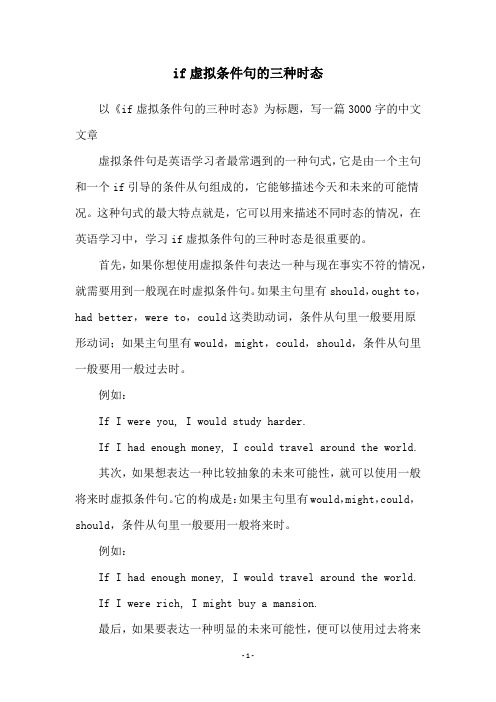
if虚拟条件句的三种时态以《if虚拟条件句的三种时态》为标题,写一篇3000字的中文文章虚拟条件句是英语学习者最常遇到的一种句式,它是由一个主句和一个if引导的条件从句组成的,它能够描述今天和未来的可能情况。
这种句式的最大特点就是,它可以用来描述不同时态的情况,在英语学习中,学习if虚拟条件句的三种时态是很重要的。
首先,如果你想使用虚拟条件句表达一种与现在事实不符的情况,就需要用到一般现在时虚拟条件句。
如果主句里有should,ought to,had better,were to,could这类助动词,条件从句里一般要用原形动词;如果主句里有would,might,could,should,条件从句里一般要用一般过去时。
例如:If I were you, I would study harder.If I had enough money, I could travel around the world.其次,如果想表达一种比较抽象的未来可能性,就可以使用一般将来时虚拟条件句。
它的构成是:如果主句里有would,might,could,should,条件从句里一般要用一般将来时。
例如:If I had enough money, I would travel around the world. If I were rich, I might buy a mansion.最后,如果要表达一种明显的未来可能性,便可以使用过去将来时虚拟条件句。
它的构成是:如果主句里有should,ought to,had better,were to,could这类助动词,条件从句里一般要用过去将来时。
例如:If I had enough money, I would have traveled around the world.If I were rich, I could have bought a mansion.总的来说,学习if虚拟条件句的三种时态是很重要的,对于英语学习者来说,能够准确的使用这三种时态,不仅能够让文章显得更加丰富,而且能够让文章的表达更加准确。
if条件句

if条件句
if条件句是一类英语句型,用于表达条件和假设。
其基本结构为
“If + 条件句子,主句”。
其中,条件句子通常采用现在时、过去时或虚拟语气的形式,主句则是表示结果的句子。
if条件句通常分为四种类型:
1.真实条件句(Real Conditional Sentences):表示可能发生的情况,条件句子使用现在时态,主句使用将来时态。
例句:If it rains tomorrow, I will stay at home.
如果明天下雨,我会呆在家里。
2.虚拟条件句(Unreal Conditional Sentences):表示假设或不可能实现的情况,条件句子使用虚拟语气,主句使用过去时态。
例句:If I had a million dollars, I would buy a house in the countryside.
如果我有一百万美元,我会在郊区买房子。
3.第二种虚拟条件句(Second Conditional Sentences):表示目前不可能实现的情况,条件句子使用虚拟语气,主句使用现在时态。
例句:If I were you, I would quit that job.
如果我是你,我会辞掉那份工作。
4.混合虚拟条件句(Mixed Conditional Sentences):表示对过去的事情进行虚拟推论,条件句子使用过去时态,主句使用现在完成时态。
例句:If he had studied harder, he would have passed the exam.
如果他学得更努力些,他就能通过考试了。
if从句后面接的过去时态
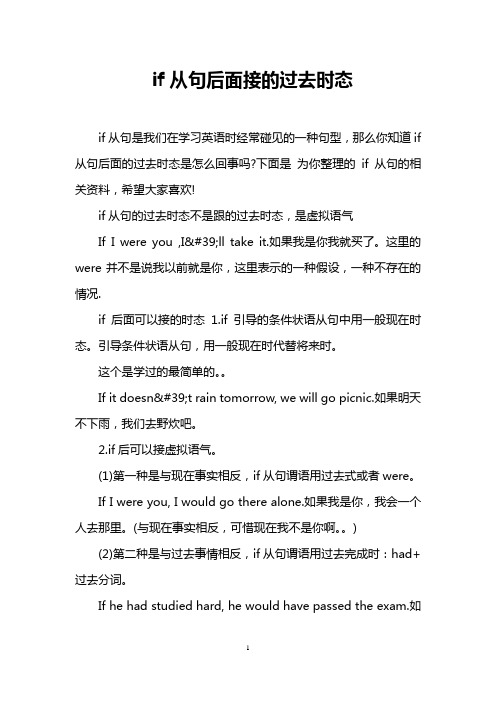
if从句后面接的过去时态if从句是我们在学习英语时经常碰见的一种句型,那么你知道if 从句后面的过去时态是怎么回事吗?下面是为你整理的if从句的相关资料,希望大家喜欢!if从句的过去时态不是跟的过去时态,是虚拟语气If I were you ,I'll take it.如果我是你我就买了。
这里的were并不是说我以前就是你,这里表示的一种假设,一种不存在的情况.if后面可以接的时态1.if引导的条件状语从句中用一般现在时态。
引导条件状语从句,用一般现在时代替将来时。
这个是学过的最简单的。
If it doesn't rain tomorrow, we will go picnic.如果明天不下雨,我们去野炊吧。
2.if后可以接虚拟语气。
(1)第一种是与现在事实相反,if从句谓语用过去式或者were。
If I were you, I would go there alone.如果我是你,我会一个人去那里。
(与现在事实相反,可惜现在我不是你啊。
)(2)第二种是与过去事情相反,if从句谓语用过去完成时:had+过去分词。
If he had studied hard, he would have passed the exam.如果他过去努力学习,他现在就已经通过考试了。
(3)第三种是与将来事实相反,if从句谓语用动词过去式,should +动词原形,或were to + 动词原形。
If I should do/were to do/did it, I would do it in a different way.如果我做这个,我将会用另一种方法来做。
if条件句的时态if有两大用法,一个是译为一般的如果,一个是用作假设的如果在if 引导的条件状语从句中,如果从句谈论的是一个推测将来有可能发生的事实,主句用一般将来时态,从句用一般现在时态。
一般译为如果,如:if it rains tomorrow,i won't go out.如果if 条件句谈论的是一个主观的意愿,则主句,从句大多用一般现在时态。
if主将从现的用法例句
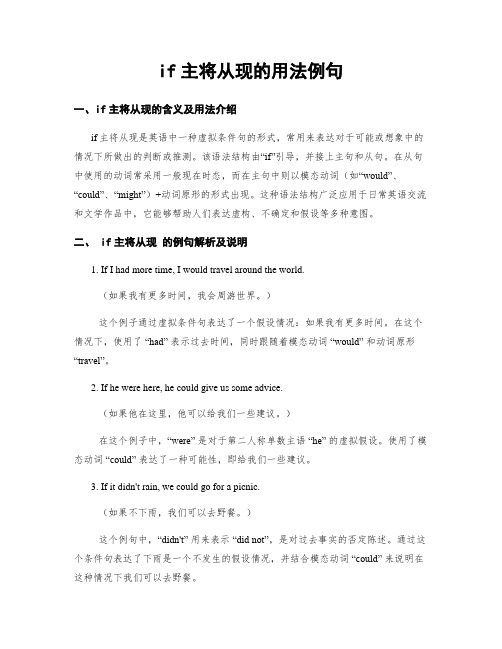
if主将从现的用法例句一、if主将从现的含义及用法介绍if主将从现是英语中一种虚拟条件句的形式,常用来表达对于可能或想象中的情况下所做出的判断或推测。
该语法结构由“if”引导,并接上主句和从句。
在从句中使用的动词常采用一般现在时态,而在主句中则以模态动词(如“would”、“could”、“might”)+动词原形的形式出现。
这种语法结构广泛应用于日常英语交流和文学作品中,它能够帮助人们表达虚构、不确定和假设等多种意图。
二、 if主将从现的例句解析及说明1. If I had more time, I would travel around the world.(如果我有更多时间,我会周游世界。
)这个例子通过虚拟条件句表达了一个假设情况:如果我有更多时间。
在这个情况下,使用了“had” 表示过去时间,同时跟随着模态动词“would” 和动词原形“travel”。
2. If he were here, he could give us some advice.(如果他在这里,他可以给我们一些建议。
)在这个例子中,“were” 是对于第二人称单数主语“he” 的虚拟假设。
使用了模态动词“could” 表达了一种可能性,即给我们一些建议。
3. If it didn't rain, we could go for a picnic.(如果不下雨,我们可以去野餐。
)这个例句中,“didn't” 用来表示“did not”,是对过去事实的否定陈述。
通过这个条件句表达了下雨是一个不发生的假设情况,并结合模态动词“could” 来说明在这种情况下我们可以去野餐。
4. If I had studied harder, I might have passed the exam.(如果我努力学习,或许能通过考试。
)在这个例子中,“had studied” 是对过去某个时间前的学习情况进行虚拟陈述。
使用了“might have passed”作为推测,有可能通过考试。
If条件状语从句的用法
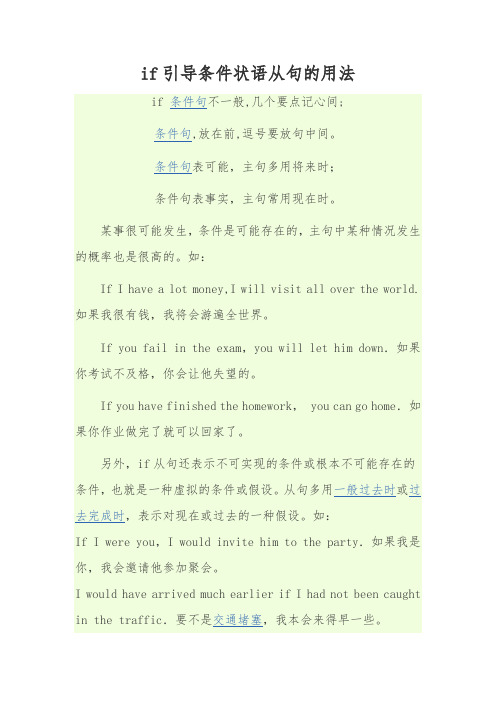
if引导条件状语从句的用法if 条件句不一般,几个要点记心间;条件句,放在前,逗号要放句中间。
条件句表可能,主句多用将来时;条件句表事实,主句常用现在时。
某事很可能发生,条件是可能存在的,主句中某种情况发生的概率也是很高的。
如:If I have a lot money,I will visit all over the world.如果我很有钱,我将会游遍全世界。
If you fail in the exam,you will let him down.如果你考试不及格,你会让他失望的。
If you have finished the homework,you can go home.如果你作业做完了就可以回家了。
另外,if从句还表示不可实现的条件或根本不可能存在的条件,也就是一种虚拟的条件或假设。
从句多用一般过去时或过去完成时,表示对现在或过去的一种假设。
如:If I were you,I would invite him to the party.如果我是你,我会邀请他参加聚会。
I would have arrived much earlier if I had not been caught inthe traffic.要不是交通堵塞,我本会来得早一些。
另外你还要注意if 条件句的时态搭配1.if从句用一般现在时,主句用一般将来时If he runs he’ll get there in time. 如果他用跑的,他就会及时赶到那儿。
The cat will scratch you if you pull her tail. 如果你拉猫的尾巴,它就会抓你。
2.if从句用一般现在时,主句用may/might/canIf the fog gets thicker the plane may/might be diverted. 如果雾在大一些,飞机可能就会改在别的机场降落。
If it stops snowing we can go out. 如果雪停了,我们就可以出去。
详细版if的用法
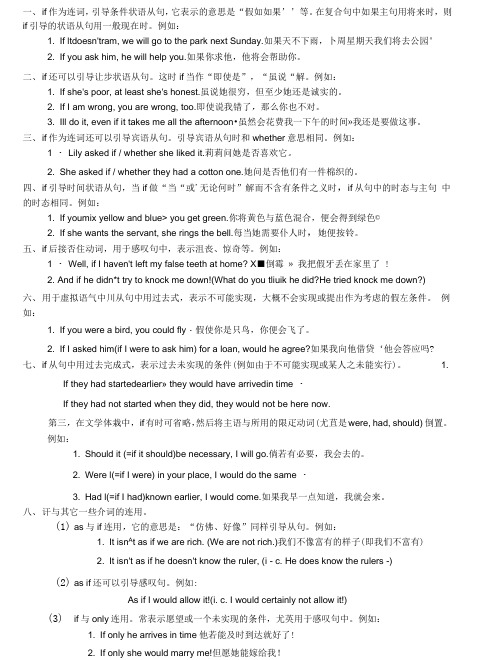
一、i f作为连词,引导条件状语从句,它表示的意思是“假如如果’’等。
在复合句中如果主句用将来时,则if引导的状语从句用一般现在时。
例如:1. If ltdoesn'tram, we will go to the park next Sunday.如果天不下雨,卜周星期天我们将去公园°2. If you ask him, he will help you.如果你求他,他将会帮助你。
二、i f还可以引导让步状语从句。
这时if当作“即使是”,“虽说“解。
例如:1. If she's poor, at least she's honest.虽说她很穷,但至少她还是诚实的。
2. If I am wrong, you are wrong, too.即使说我错了,那么你也不对。
3. Ill do it, even if it takes me all the afternoon•虽然会花费我一下午的时间»我还是要做这事。
三、i f作为连词还可以引导宾语从句。
引导宾语从句时和whether意思相同。
例如:1 ・ Lily asked if / whether she liked it.莉莉问她是否喜欢它。
2. She asked if / whether they had a cotton one.她问是否他们有一件棉织的。
四、i f引导时间状语从句,当if做“当“或'无论何时”解而不含有条件之义时,if从句中的时态与主句中的时态相同。
例如:1. If youmix yellow and blue> you get green.你将黄色与蓝色混合,便会得到绿色©2. If she wants the servant, she rings the bell.每当她需要仆人时,她便按铃。
五、i f后接否住动词,用于感叹句中,表示沮丧、惊奇等。
例如:1 ・ Well, if I haven't left my false teeth at home? X■倒霉» 我把假牙丢在家里了 !2. And if he didn*t try to knock me down!(What do you tliuik he did?He tried knock me down?)六、用于虚拟语气中川从句中用过去式,表示不可能实现,大概不会实现或提出作为考虑的假左条件。
if 的用法时态

if 的用法时态一、使用if引导条件句(Conditionals)if是英语中最常用的条件句引导词之一,用于表示假设或条件。
在句子中,if 通常引导从句,而主句则表达可能的结果或后果。
if的使用时态有以下几种情况:1. 使用一般现在时态如果我们想要表达一个普遍性的条件,即主语经常或习惯性地发生某种动作或状态,则使用一般现在时态。
例:If it rains, she always carries an umbrella.(如果下雨,她总是带着伞。
)这个例子中,使用了一般现在时来表达下雨是一个经常性事件,而她带伞是对这个事件的反应。
2. 使用一般过去时态当我们想要表达一个假设的情况出现在过去,并且主句中所描述的结果也发生在过去时,我们可以使用一般过去时。
例:If I had studied harder, I would have passed the exam.(如果我学习更努力些,我就能通过考试了。
)这个例子中,主语没有足够努力学习并没能通过考试,但我们可以通过if引导的条件来构建一个假设。
3. 使用过去完成时态有时候我们需要讨论一个假设对过去更早时间发生的影响,这时我们可以使用过去完成时。
例:If he had arrived earlier, he would have caught the train.(如果他早点到,他就能赶上那趟火车。
)在这个例子中,主语没有及时到达以致于错过了火车,我们通过if引导的条件来表达一个过去未实现的假设情况。
4. 使用将来时态当我们要表达一个将要发生或可能会发生的假设情况时,可以使用将来时态。
例:If it snows tomorrow, we will go skiing.(如果明天下雪的话,我们就会去滑雪。
)这个例子中,通过if引导的条件句表达了对明天可能发生下雪的猜测,并对该条件作出相应反应。
二、注意事项和其他用法1. 与虚拟语气连用if引导的条件句经常与虚拟语气一起使用,特别是在第二和第三种情况中。
if引导的条件状语从句的用法

(3)假设
真的,或者有可能成为真的;
(二)假设将来,假设的条
将来
件是将来可能实现的。
1. if 非真实条件句(虚拟)——假设现在
(二)遵循的原则
should do
might+do
例 7 If I _____(be) a bird,I would fly to you right
状态,是正在玩球的意思,
所以此空填 is playing。
3. if 引导的真实条件状语从句——假设将来
例 3 If it _____(rain) tomorrow,we will stay at home.
解析:如果你不想受伤,
就不要玩刀。根据 Don’
t
play with the knife,主句是祈使句,所以从句为 if 引导
to the park.
he will take me to the park,主句用的一般将来时,而且
可以分析出,他哥哥现在还没有回,所以从句为 if 引
导的表将来的条件状语从句。根据“主将从现”的原
则,此空填 comes。
2. if 非真实条件句(虚拟)——假设过去
例8
Years ago if someone_____ (turn) round to
批改学生作文时,遇到拼写错误较多的学生可以这样
及各个时代相关代表作品的赏析,感受中西方文化的
评价:
不同,提高其审美水平;在进行人教版(2014)高中英
neat and tidy!
学生参观学校的科学实验室或者本地的科技馆,感受
1. 认 同 欣 赏:I like your handwriting,which is so
初中阶段if引导的从句及用法分析
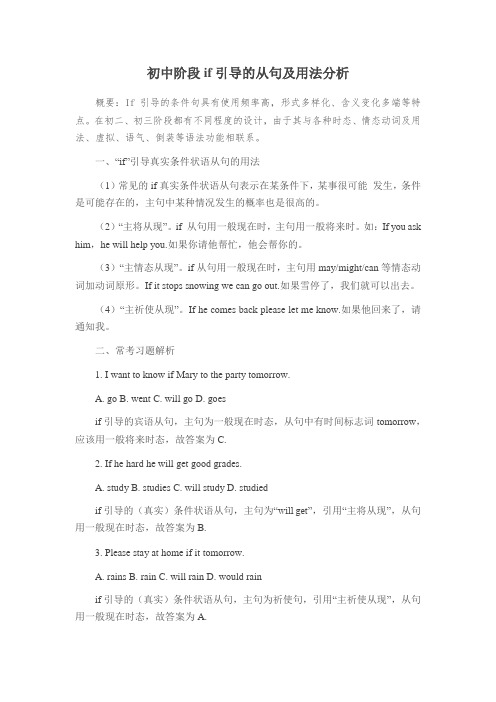
初中阶段if引导的从句及用法分析概要:If引导的条件句具有使用频率高,形式多样化、含义变化多端等特点。
在初二、初三阶段都有不同程度的设计,由于其与各种时态、情态动词及用法、虚拟、语气、倒装等语法功能相联系。
一、“if”引导真实条件状语从句的用法(1)常见的if真实条件状语从句表示在某条件下,某事很可能发生,条件是可能存在的,主句中某种情况发生的概率也是很高的。
(2)“主将从现”。
if 从句用一般现在时,主句用一般将来时。
如:If you ask him,he will help you.如果你请他帮忙,他会帮你的。
(3)“主情态从现”。
if从句用一般现在时,主句用may/might/can等情态动词加动词原形。
If it stops snowing we can go out.如果雪停了,我们就可以出去。
(4)“主祈使从现”。
If he comes back please let me know.如果他回来了,请通知我。
二、常考习题解析1. I want to know if Mary to the party tomorrow.A. goB. wentC. will goD. goesif引导的宾语从句,主句为一般现在时态,从句中有时间标志词tomorrow,应该用一般将来时态,故答案为C.2. If he hard he will get good grades.A. studyB. studiesC. will studyD. studiedif引导的(真实)条件状语从句,主句为“will get”,引用“主将从现”,从句用一般现在时态,故答案为B.3. Please stay at home if it tomorrow.A. rainsB. rainC. will rainD. would rainif引导的(真实)条件状语从句,主句为祈使句,引用“主祈使从现”,从句用一般现在时态,故答案为A.4.If he on smoking it may be very bad for his health.A. goB. goesC. will goD. wentif引導的(真实)条件状语从句,主句为“may be”,引用“主情态从现”,从句用一般现在时态,故答案为B.5.If I you I would give up smoking immediately.A. amB. wasC. wereD. likeif引导的非真实条件状语从句,主句为“would+动词原形”,从句要用一般过去时态,遇到be无论第几人称都用were故答案为B。
if条件状语从句讲解与练习

if引导的条件状语从句1) 用法:(1)条件状语从句通常由连词if引导,意为“如果、假如”,主句不能用be going to表示将来,而应该用shall,will。
If you leave now, you are never going to regret it. (错误)If you leave now, you will never regret it. (正确)(2)if “如果”,引导条件状语从句,主句用一般将来时,从句则用一般现在时,如:If it rains tomorrow, I shan’t climb the hills.(3)另外,主句是祈使句或含有情态动词,从句也用一般现在时。
如:Please call me if he comes next Sunday.Can you call the policeman if you are in the trouble.注意宾语从句中的if与条件状语从句if的区别。
宾语从句中的if“是否”相当于whether,引导宾语从句,时态需根据语境确定。
如果主句用一般现在时,从句可以根据具体情况选用时态,如果主句用一般过去时,从句必须用过去式的某种形式。
I don't know if it will rain tomorrow. 我不知道明天是否会下雨。
Our teacher said there was going to be a football match the next month.我们说下月将有场足球比赛。
【边学边做】用括号内所给词的正确形式填空。
1. What will you buy if you ________(have)a lot of money?2. If it __________(not snow)tomorrow, we will feel unhappy.3. You mustn’t go to school if you ________(be)still in bed.4. If he _______(be)at home at that time, he would know it.5. Please show me the way if you ________(know)it.6. You will hurt your teeth if you ________(eat)too much candy.7. If you gave me a toy car, I _________(be)very happy.8. I would get the prize if I _________(work)hard.9.If she ______ (finish ) work early ,she ______(go) home.10.If the weather______(be)fine,we_______(go)for a walk .11. If I_____(have) time tonight ,I _______(finish) the book I’m reading.12. If it ______(rain) next weekend , we_______(not be able to ) plant the vegetable .13. If it_______(rain),we______(stay) at home .14.If she______(arrive) ,she _____(phone) me .15. If he_____(call),tell him I’ll ring back .if 条件状语从句的时态练习一.在正确的答案下划一条线。
if条件状语从句

If引导的条件状语从句在复合句中,由从句表示的状语叫做状语从句。
它可以用来修饰主语中的动词、形容词、副词等。
根据它表达的意思,状语从句可以分为时间状语从句、地点状语从句、条件状语从句、比较状语从句、目的状语从句,结果状语从句和让步状语从句等。
由连接词if或unless 引导的状语从句叫做条件状语从句。
在含有条件状语从句的复合句中,如果主句是一般将来时态,从句要用一般现在时。
1.在if引导的条件状语从句中,如果从句谈论的是一个有可能发生的事实及其产生的相关结果,主句用一般将来时态,从句用一般现在时态。
如:If it rains tomorrow , we will not go to the zoo . 如果明天下雨,我们就不去动物园了。
2.如果if条件句谈论的是客观事实、重复发生和预示要发生的情景和事件,则主从句大多用一般现在时。
如:If bears are in danger , they attack people . 如果熊处于危险中,他们就会攻击人。
3.if引导的条件句有真实条件句和非真实条件句两种:(1)真实条件句,表示在某种条件下某事很可能发生。
如:If you ask him , he will help you . 如果你请他帮忙,他会帮你的。
(2)非真实条件句是虚拟语气的一种,表示不可实现的条件或根本不可能存在的条件,也就是一种虚拟的条件或假设,从句多用一般过去时或过去完成时(be动词用were)。
如:If I were you , I would invite him to the party . 如果我是你,我会邀请他参加聚会。
选择题1. I don’t know if ___ tomorrow.A. it doesn’t rainB. the rain will stopsC. the rains won’t stopD. it won’t rain2 . The volleyball match will be put off if it___ .A. will rainB. rainsC. rainedD. is raining3. Difficulties are nothing if we ___ not afraid of themA. willB. shallC. areD. do4. We ___ Beijing tomorrow if it doesn’t rain.A. are going toB. wouldC. shallD. will go5. I don’t like to be interrupted if I___ .A. speakB. will speakC. am speakingD. spoke6. If you ___ the book you will understand the story better.A. will be readingB. have readC. will have readD. read7. I’ll go to meet you,if I ___ free then.A. would beB. will beC. amD. was8. I want to know if you___ to the party tomorrow.I will if I___ free.A. will come; amB. come; amC. will come; will beD. come; will be9. There is going to ___ a sports meeting next week. If it ___ , we’ll have to cancel it..A. be; will rainB. have; will rainC. be; rainsD. give; is going to rain10. If he ___ , I ___ swimming alone.A. doesn’t come will goB. won’t come; will goC. will come; won’t goD. is coming; don’t go11.I don't know if he___ tomorrow.If he ___ ,I'll tell you.A.will come;comes B.comes;comesC.comes;will D.is coming;is coming12.If you _____ to the party, you would have a great time.A. will goB. wentC. goD. going。
if条件句中的时态应用
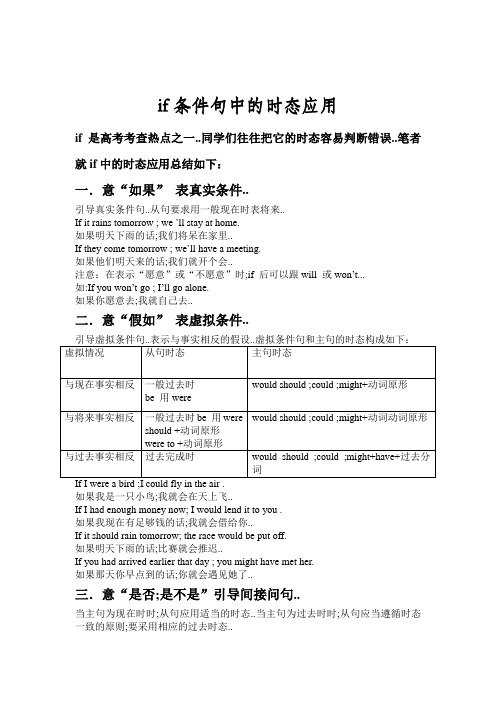
if条件句中的时态应用if是高考考查热点之一..同学们往往把它的时态容易判断错误..笔者就if中的时态应用总结如下:一.意“如果”表真实条件..引导真实条件句..从句要求用一般现在时表将来..If it rains tomorrow ; we `ll stay at home.如果明天下雨的话;我们将呆在家里..If they come tomorrow ; we`ll have a meeting.如果他们明天来的话;我们就开个会..注意:在表示“愿意”或“不愿意”时;if 后可以跟will 或won’t...如:If you won’t go ; I’ll go alone.如果你愿意去;我就自己去..二.意“假如”表虚拟条件..如果我是一只小鸟;我就会在天上飞..If I had enough money now; I would lend it to you .如果我现在有足够钱的话;我就会借给你..If it should rain tomorrow; the race would be put off.如果明天下雨的话;比赛就会推迟..If you had arrived earlier that day ; you might have met her.如果那天你早点到的话;你就会遇见她了..三.意“是否;是不是”引导间接问句..当主句为现在时时;从句应用适当的时态..当主句为过去时时;从句应当遵循时态一致的原则;要采用相应的过去时态..I don’t know if they will come tomorrow.我不知道他们明天是否会来..He asked if they would come the next day.他问他们第二天是否会来..注意:在正式的文件中;若句中有助动词had 、were 、should;则将其提前;省略if.Had it not been for your help;we would not have achieved so much.要不是你的帮助;我们不会取得如此大的成绩..四.固定搭配:①if only :意“要是……就好了”;表示一种不真实的条件..其后接从句..从句用虚拟语气..用一般过去时表示现在没有实现的愿望;对过去没有实现的愿望从句用过去完成时..If only I had taken mother’s advice.我要是听妈妈的建议就好了..If only I could speak several foreign languages .我要是能讲几种外语就好了..区别only if: :意“只有在……条件下才……”用来加强从句的语气..当其位于句首时;主句用倒装语序..He would succeed only if he tried hard .→Only if he tried hard ;would he succeed.只有他努力他才会成功..②:as if /though意“好象”引导状语从句或表语从句..当从句的内容为不真实情况时要采用虚拟语气..与现在事实相反从句用一般过去时;与过去事实相反从句用过去完成时..与将来事实相反从句用would could ;might +动词原形She cried as if her heart could be broken.她哭得好象心都要碎了..③:even if 意“即使、纵使”连词;引导让步状语从句..Even if he is poor ;she loves him.即使他很穷;她仍然爱他..巩固练习1.She seldom ;_____;blames her failure on others.A. if everB. if anyC. if necessaryD. if possible2. I had never spent a more worrying day. It seemed _____the day would never end.A. as ifB. even ifC. as soon asD. as long as3. If a man _____succeed; he must work as hard as he can .A. willB. is toC. is going toD. should4. If it _____tomorrow; we’ll go roller-skating.A. isn’t rainB. won’t rainC. doesn’t rainD. doesn’t fine5.I think it is necessary for my 19-year-old son to have his own mobile phone;for I sometimes want to make sure if he ___ home for dinner .06高考A eB es C. has come D . will come6 .In time of serious accidents ;___we know some basic things about first aid ;we can save lives.06高考A . whether B. until C .if D .unless7 .If you ____ wait over there for a minute ;Mr. Smith ;I’ll tell our manager you’ve arrived.A. mustB. shouldC. willD. can8.____ for the doctor’s careful treatment ;he ____till last year.A. If it is not ;can’t liveB. Were it not ;couldn’t liveC. Had it not been ;couldn’t have livedD. If it wasn’t ;can’t live9. It would be impossible for him to leave hospital tomorrow if he ___first aid when the accident happened.A hadn’t be givenB .wasn’t be givenC. shouldn’t be givenD. wouldn’t be given10.If I ___plan to do anything I wanted to ;I’d like to go to Tibet and travel through as much of it as possible.05高考A. would B .could C .had to D . ought to答案:1A2A3B4C5D6C7C8C9A10B。
if引导的虚拟语气时态规则

if引导的虚拟语气时态规则在英语语法中,虚拟语气是一种用来表达假设、愿望、建议或对未来情况的猜测的语法结构。
其中,以if引导的虚拟语气时态规则是其中的一种形式。
本文将详细介绍这一规则的用法和注意事项。
一、虚拟语气的基本概念虚拟语气是一种非真实的语气,用来表达与事实相反或与现实情况不符的假设、愿望或建议。
它通常用于条件句中,以if引导。
虚拟语气有三种时态形式:过去时、过去完成时和过去将来时。
二、以if引导的虚拟语气时态规则1. 过去时虚拟语气当我们想表达与现在事实相反的假设时,可以使用过去时虚拟语气。
其结构为:if + 主语+ 动词的过去式,主语+ would/could/might + 动词原形。
例如:- If I were rich, I would travel around the world.- If she had studied harder, she might have passed the exam.2. 过去完成时虚拟语气当我们想表达与过去事实相反的假设时,可以使用过去完成时虚拟语气。
其结构为:if + 主语+ had + 过去分词,主语+would/could/might + have + 过去分词。
例如:- If I had known the truth, I would have told you.- If they had arrived earlier, they might have caught the train.3. 过去将来时虚拟语气当我们想表达与将来事实相反的假设时,可以使用过去将来时虚拟语气。
其结构为:if + 主语 + should/were to + 动词原形,主语+ would/could/might + 动词原形。
例如:- If it should rain tomorrow, we would stay at home.- If he were to win the lottery, he could buy a new car.三、注意事项1. 在虚拟语气中,动词的形式会发生变化。
if 条件句虚拟语气
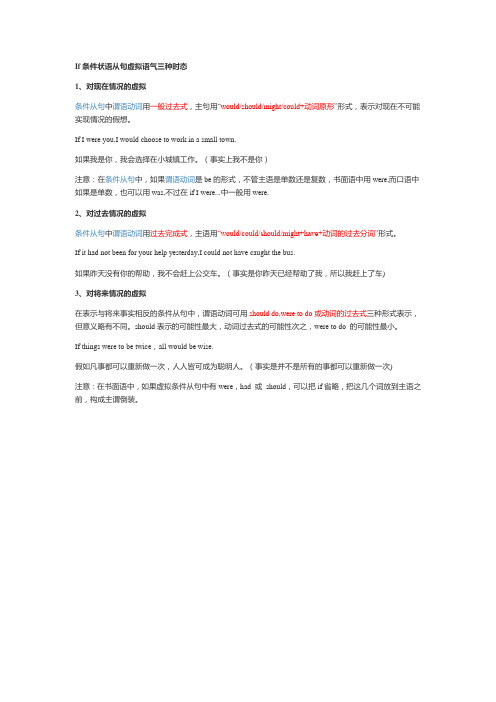
If条件状语从句虚拟语气三种时态1、对现在情况的虚拟条件从句中谓语动词用一般过去式,主句用“would/should/might/could+动词原形”形式,表示对现在不可能实现情况的假想。
If I were you,I would choose to work in a small town.如果我是你,我会选择在小城镇工作。
(事实上我不是你)注意:在条件从句中,如果谓语动词是be的形式,不管主语是单数还是复数,书面语中用were,而口语中如果是单数,也可以用was,不过在if I were...中一般用were.2、对过去情况的虚拟条件从句中谓语动词用过去完成式,主语用“would/could/should/might+have+动词的过去分词”形式。
If it had not been for your help yesterday,I could not have caught the bus.如果昨天没有你的帮助,我不会赶上公交车。
(事实是你昨天已经帮助了我,所以我赶上了车)3、对将来情况的虚拟在表示与将来事实相反的条件从句中,谓语动词可用should do,were to do或动词的过去式三种形式表示,但意义略有不同。
should表示的可能性最大,动词过去式的可能性次之,were to do 的可能性最小。
If things were to be twice,all would be wise.假如凡事都可以重新做一次,人人皆可成为聪明人。
(事实是并不是所有的事都可以重新做一次)注意:在书面语中,如果虚拟条件从句中有were,had 或should,可以把if省略,把这几个词放到主语之前,构成主谓倒装。
- 1、下载文档前请自行甄别文档内容的完整性,平台不提供额外的编辑、内容补充、找答案等附加服务。
- 2、"仅部分预览"的文档,不可在线预览部分如存在完整性等问题,可反馈申请退款(可完整预览的文档不适用该条件!)。
- 3、如文档侵犯您的权益,请联系客服反馈,我们会尽快为您处理(人工客服工作时间:9:00-18:30)。
if条件句中的时态应用
if是高考考查热点之一。
同学们往往把它的时态容易判断错误。
笔者就if中的时态应用总结如下:
一.意“如果”表真实条件。
引导真实条件句。
从句要求用一般现在时表将来。
If it rains tomorrow , we `ll stay at home.
如果明天下雨的话,我们将呆在家里。
If they come tomorrow , we`ll have a meeting.
如果他们明天来的话,我们就开个会。
注意:在表示“愿意”或“不愿意”时,if 后可以跟will 或won’t.。
如:If you won’t go , I’ll go alone.
如果你愿意去,我就自己去。
二.意“假如”表虚拟条件。
引导虚拟条件句。
表示与事实相反的假设。
虚拟条件句和主句的时态构成如下:
If I were a bird ,I could fly in the air .
如果我是一只小鸟,我就会在天上飞。
If I had enough money now, I would lend it to you .
如果我现在有足够钱的话,我就会借给你。
If it should rain tomorrow, the race would be put off.
如果明天下雨的话,比赛就会推迟。
If you had arrived earlier that day , you might have met her.
如果那天你早点到的话,你就会遇见她了。
三.意“是否,是不是”引导间接问句。
当主句为现在时时,从句应用适当的时态。
当主句为过去时时,从句应当遵循时态一致的原则,要采用相应的过去时态。
I don’t know if they will come tomorrow.
我不知道他们明天是否会来。
He asked if they would come the next day.
他问他们第二天是否会来。
注意:在正式的文件中,若句中有助动词had 、were 、should,则将其提前,省略if.
Had it not been for your help,we would not have achieved so much.
要不是你的帮助,我们不会取得如此大的成绩。
四.固定搭配:
①if only :意“要是……就好了”,表示一种不真实的条件。
其后接从句。
从句用虚拟语气。
用一般过去时表示现在没有实现的愿望;对过去没有实现的愿望从句用过去完成时。
If only I had taken mother’s advice.
我要是听妈妈的建议就好了。
If only I could speak several foreign languages .
我要是能讲几种外语就好了。
区别only if: :意“只有在……条件下才……”用来加强从句的语气。
当其位于句首时,主句用倒装语序。
He would succeed only if he tried hard .
→Only if he tried hard ,would he succeed.只有他努力他才会成功。
②:as if /though意“好象”引导状语从句或表语从句。
当从句的内容为不真实情况时要采用虚拟语气。
与现在事实相反从句用一般过去时,与过去事实相反从句用过去完成时。
与将来事实相反从句用would (could ,might )+动词原形
She cried as if her heart could be broken.她哭得好象心都要碎了。
③:even if 意“即使、纵使”连词,引导让步状语从句。
Even if he is poor ,she loves him.即使他很穷,她仍然爱他。
【巩固练习】
1.She seldom ,_____,blames her failure on others.
A. if ever
B. if any
C. if necessary
D. if possible
2. I had never spent a more worrying day. It seemed _____the day would never end.
A. as if
B. even if
C. as soon as
D. as long as
3. If a man _____succeed, he must work as hard as he can .
A. will
B. is to
C. is going to
D. should
4. If it _____tomorrow, we’ll go roller-skating.
A. isn’t rain
B. won’t rain
C. doesn’t rain
D. doesn’t fine
think it is necessary for my 19-year-old son to have his own mobile phone,for I sometimes want to make sure if he ___ home for dinner .(06高考)
A e
B es C. has come D . will come
6 .In time of serious accidents ,___we know some basic things about first aid ,we can save lives.(06高考)
A . whether B. until C .if D .unless
7 .If you ____ wait over there for a minute ,Mr. Smith ,I’ll tell our manager you’ve arrived.
A. must
B. should
C. will
D. can
for the doctor’s careful treatment ,he ____till last year.
A. If it is not ;can’t live
B. Were it not ;couldn’t live
C. Had it not been ;couldn’t have lived
D. If it wasn’t ;can’t live
9. It would be impossible for him to leave hospital tomorrow if he ___first aid when the accident happened.
A hadn’t be given
B .wasn’t be given
C. shouldn’t be given
D. wouldn’t be given
I ___plan to do anything I wanted to ,I’d like to go to Tibet and travel through as much of it as possible.(05高考)
A. would B .could C .had to D . ought to
答案:1A2A3B4C5D6C7C8C9A10B。
